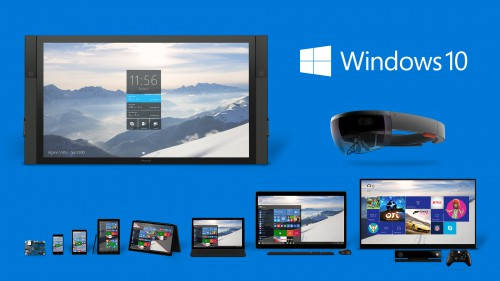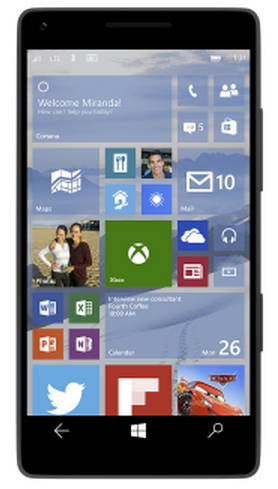| Windows 10 Cannot Fail - It's Free |
| Written by Mike James |
| Thursday, 22 January 2015 |
|
Microsoft has just released new information about Windows 10 and some other stuff - but let's concentrate on the important news for the near future. The world is going to be running Windows 10. Well - on the desktop at least. The reason is very simple Windows 10 even as far as it has progressed isn't a bad operating system. Compared to Windows 8 it is a huge step forward for desktop use. This alone would ensure that Windows 10 was at the very least a moderate success. However Microsoft just announced a killer feature - its going to be free. For the first year after it is launched users will be able to upgrade to Windows 10 for free. What is more the OS delivery system is changing so that it will be "operating system as a service". What that seems to mean is that Microsoft will upgrade the OS over the network. Ok at this point you are probably expecting a sting in the tail. Microsoft only promise to offer the free upgrade for one year after the launch. So you are probably thinking that you will have to start paying after the year is up for the "free" upgrades. But no. Microsoft also say that once you move to Windows 10 upgrades will be free for ever. This is all sounding too good to be true but the next piece of information is the real killer. You can upgrade for free to Windows 10 if you are running Window 8, or 8.1 or, and this is the really clever part - Windows 7.
Yes all those users stuck on Windows 7 because they didn't like the look of Windows 8 suddenly have an upgrade path they might find acceptable. With an entry price of "free" who isn't going to take the upgrade even if the benefits are only marginal? Yes there are always users who will use the "if it ain't broke..." argument to stay with what they have but my guess is that the majority wont. Just think of all the people you advised not to upgrade to Windows 8 and wait for the next version. The overall effect will probably be like blowing a hole in the side of the dam - look out for the flood. What this means is that Windows 10 is probably the platform to target - certainly for the desktop. Check out the promo video, but notice that only the first few minutes focus specifically on Windows 10:
What about mobile and phone? This is where things get less easy to interpret. The problem is that there are lots and lots of desktop capable machines out there and a free Windows 10 is going to find its way onto a lot of them. The problem with mobile and phone is that there aren't many of them out there in the hands of users. For mobile and phone the question is a different one. Can Windows 10 make these devices more popular with users? Of course part of the answer has always depended upon getting developers to work on apps for the platform and hence the usual chicken-and-egg problem. Not enough devices means small market, means no developers, means no users, means not enough devices... Microsoft has had the problem of breaking this loop since iOS and Android took dominate positions in the tablet/mobile market. Now Microsoft also faces the problem of Chromebooks taking over the laptop.
From our point of view Window 10 offers a simplification. Microsoft seems to be serious about its one OS for all devices. It makes you wonder why they ever gave up on the idea in the first place. However from the users point of view Windows is still going to look different on different devices. The idea of universal apps might make this less relevant. Microsoft has been pushing the idea of universal apps for a while but at the moment things don't quite fit together. The first thing to say, just in case you missed it, is that a universal app is a Windows Store app - what we used to call a Metro app or WinRT app. So the first thing to note is that this isn't Win32 any more. You build a universal app using XAML for the UI and WinRT for the API. You still have a chunk of the project that is specific to Windows and a chunk that is specific to Phone but there is also a shared chunk of code. So it isn't exactly universal more a pushing together of two different targets to take advantage of their overlap. In Windows 10 Microsoft is wiping out the distinction between desktop, tablet and phone version of Windows - they are all going to be called Windows 10. This is nice but it glosses over the small fact that phones and tablets are often ARM based and this is a problem. Microsoft tried to solve the problem by producing an ARM based version of Windows called Windows RT. There is no word at the moment what the future of Windows RT is - but my guess is that it is dead. Microsoft seems to be saying that Windows 10 will run on x86 or ARM. This is feasible but difficult. What is far from clear is what Microsoft is claiming when it comes to universal apps. If everything is Windows 10 does this mean that there is no real distinction between desktop. tablet and mobile apart from the size of the screen and the availability of touch? Microsoft isn't being very clear on this but various statements suggest that there will still be API differences. So I guess a lot of what matters next is how big are the differences. Microsoft has announce a set of universal apps that include Office that are claimed to run in the same way on the desktop, tablet and mobile. Add to this promised unity across devices - tablets that become portables when you add a keyboard and transfer of context from devices such as Xbox - might drive users who own any one Windows device to extend to Windows on other devices. If this works well then it could be what is needed to move users onto the Windows OS on tablets and perhaps even phones. To quote: "We want to move from people needing Windows, to choosing Windows and loving Windows. That is our bold goal with Windows." - Satya Nadella This is certainly the right idea. For Windows 8 the motto seems to have been: "You will like what we tell you to like." An approach that seems to have worked for Apple but not for Microsoft. We still need more information and a preview of Windows 10 for Phones is promised next month. Overall however it is all looking as good as it could be. Note: Look out for more news on other interesting announcements about Windows 10 announcements - Project Spartan, Windows Holographic and more...
More InformationRelated ArticlesMicrosoft Planning A New Browser Windows XP Loses Share Windows 8.1 Gains Developers - Microsoft Is Back! Windows 8 Doing Badly, Windows 7 Gets Extension Microsoft Reveals "Universal" Apps Windows 8 Users Hardly Use Any Modern Apps How Microsoft Could Have Done Metro
To be informed about new articles on I Programmer, install the I Programmer Toolbar, subscribe to the RSS feed, follow us on, Twitter, Facebook, Google+ or Linkedin, or sign up for our weekly newsletter.
Comments
or email your comment to: comments@i-programmer.info |
| Last Updated ( Thursday, 22 January 2015 ) |




